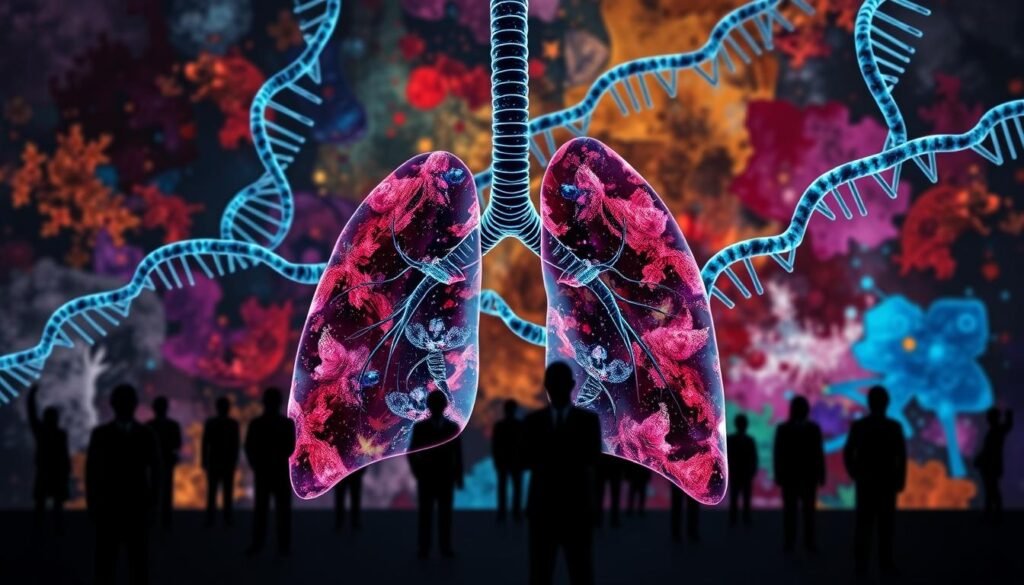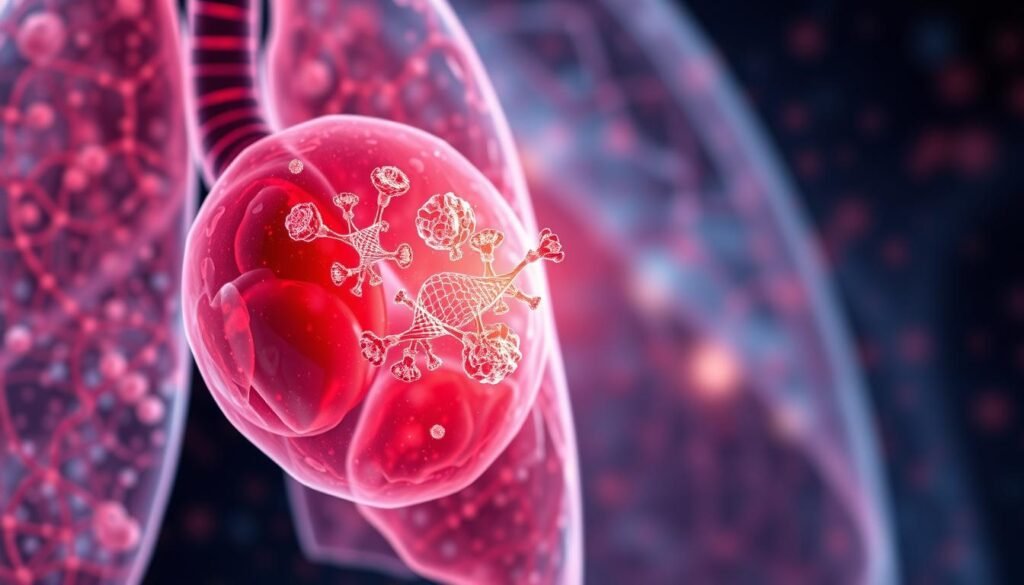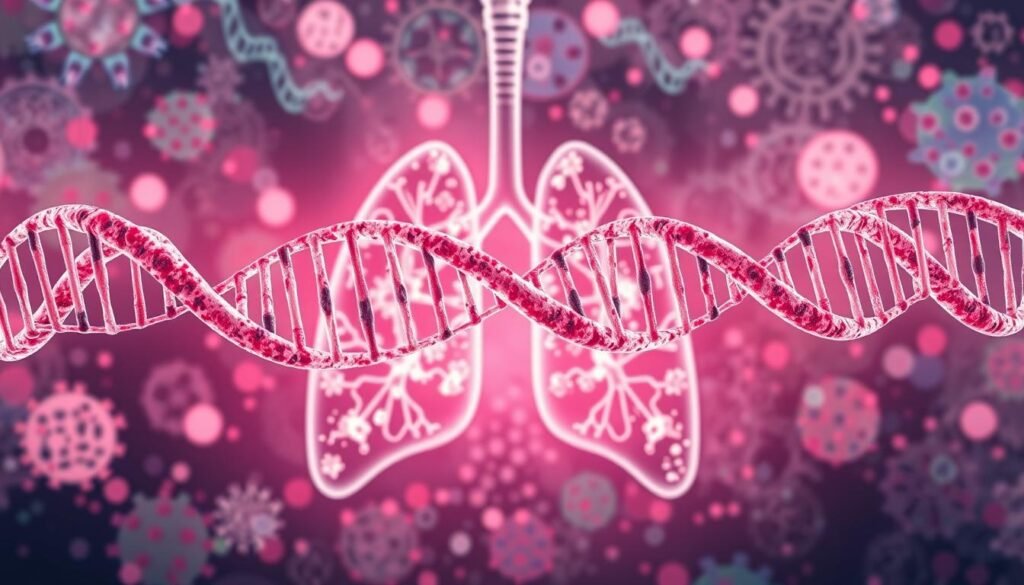Lung cancer is a major health issue worldwide. It’s behind 11.6% of all cancer cases and causes 18.4% of cancer deaths. This fact highlights the need to explore more about what leads to this serious illness. A key focus in lung cancer research is understanding how inherited mutations play a role. Knowing about these genetic changes helps detect the disease early and guides the customization of treatments.
This piece explores how inherited genes are linked to lung cancer. It discusses common mutations such as EGFR, KRAS, and BRCA. The goal is to raise awareness and show why genetic testing is vital in lung cancer studies. Thanks to ongoing research, we’re making strides in finding better treatments and personalized care plans.
Key Takeaways
- Lung cancer represents approximately 11.6% of all cancer cases globally.
- Inherited mutations may contribute significantly to lung cancer susceptibility.
- Common mutations associated with lung cancer include EGFR, KRAS, and BRCA variants.
- Understanding genetic factors is critical for early detection and treatment customization.
- In-depth genetic testing holds great promise for those at risk for lung cancer.
- Familial aggregation of cancer cases suggests a shared genetic component in some instances.
Understanding Lung Cancer
Lung cancer is a major global health issue. It’s shocking to see the stats. It’s the top cancer worldwide, making up about 11.6% of all cases. Around 18.4% of all cancer deaths are due to lung cancer. This equals over 1.8 million deaths each year.
Global Statistics and Impact
The seriousness of lung cancer cannot be overstated. The stats underscore the need for early detection and better treatments. It’s often found too late, which hurts survival rates. Knowing whether a person has non-small cell lung cancer (NSCLC) or small cell lung cancer (SCLC) guides the treatment.
Types of Lung Cancer
Non-small cell lung cancer (NSCLC) is the most common, at 85% of cases. NSCLC is made up of:
- Adenocarcinoma
- Squamous cell carcinoma
- Large cell carcinoma
Small cell lung cancer makes up about 15% of cases. It grows quickly and is very aggressive. The type of lung cancer someone has is key to choosing the right treatment. For more about lung cancer symptoms and detection, check out this resource.
The Role of Genetics in Lung Cancer
Understanding how genetics impacts cancer helps us see why lung cancer happens. Genetics play a big part in cancer, affecting cell behavior. Both inherited and acquired mutations shape our risk of getting lung cancer. Knowing the role of these genetic parts lets doctors and researchers plan better for prevention and treatment.
How Genes Influence Cancer Development
There are two main types of genetic changes in cancer: inherited and acquired mutations. Inherited ones come from our parents and can make us more likely to get lung cancer. Acquired mutations usually happen because of things like smoking. While most lung cancer comes from acquired mutations, about 1% is from inherited ones.
Inherited vs. Acquired Mutations
Inherited and acquired mutations show us different risks for lung cancer. Most lung cancer, about 80% to 90%, is due to acquired mutations from smoking and other environmental factors. However, inherited mutations also play a role in about 8% of cases. Knowing this helps find people who are more likely to get lung cancer, especially if they have family members with the disease. The mutations linked to lung cancer can be different across ethnic groups. This affects who might get lung cancer and how it can be treated.
Inherited Mutations Linked to Lung Cancer
It’s key to understand how inherited mutations link to lung cancer. This helps better screening and treatment. Genetic factors play a big role in how likely someone is to get lung cancer. This is especially true for mutations passed down in families. Knowing these mutations lets doctors create precise prevention and screening plans.
Common Genetic Mutations Associated with Lung Cancer
Some genetic mutations are often seen in lung cancer patients. Here are a few key examples:
- EGFR – These mutations are often found in nonsmokers.
- KRAS – Common in cancers from environmental causes.
- ALK – Can cause cancer growth when altered.
- BRCA1 and BRCA2 – While known for breast cancer, they also affect lung cancer risk.
- TP53 – A major gene that helps suppress tumors.
- CHEK2 – Plays a role in cell cycle control and DNA repair.
Studies show inherited gene changes, like germline mutations, might raise lung cancer risk. These findings underline the importance of genetic screening for those with family history of lung cancer.
The Impact of Familial Lung Cancer Risk
Familial lung cancer is a serious concern. It happens when shared genes make many family members likely to get lung cancer. Research found that nonsmokers with specific inherited mutations, like EGFR T790M, have a higher lung cancer risk. The INHERIT trial showed that 55% with this mutation got diagnosed before turning 60.
More studies discovered risk markers on chromosome 6q for nonsmokers. Genetic tests for family members can reveal risky mutations early. This means better chances to monitor and prevent lung cancer. Knowing about these risks makes it vital to check family history during screenings. This leads to stronger prevention strategies.
Genetic Predisposition and Lung Cancer Risk
Learning about genetic factors is key to spotting lung cancer risks early. Family history, gene mutations, and the environment all play a part. Knowing these can help us catch and prevent lung cancer sooner.
Identifying High-Risk Patients
For 20 years, scientists have studied how genes affect lung cancer. They have found many genetic links. For instance, having a relative with lung cancer increases your risk. Yet, inherited lung cancers are rare, about 8%. This shows why understanding genetics is vital.
In lung adenocarcinomas, 60% show specific gene mutations. This makes genetic tests very useful. They help find who is at higher risk of developing lung cancer.
Factors Contributing to Genetic Susceptibility
Genes and the environment play roles in lung cancer risk. Smoking causes most lung cancers. But, some non-smokers get lung cancer too. This shows there are different risk factors.
Dangers like radon, asbestos, and secondhand smoke increase risk. Certain gene variations also affect this risk. They prove how genes and environment work together in lung cancer risks.

Oncogene Mutations and Tumor Development
Knowing about oncogene mutations is key to understanding how tumors form, especially in lung cancer. These are genes that, when changed, cause cells to grow out of control. This plays a big role in lung cancer. Non-small cell lung cancer (NSCLC) shows these mutations a lot. Finding these mutations can help choose the right treatment.
Key Oncogenes in Lung Cancer
Some major oncogenes play a big role in lung cancer. Important ones are:
- EGFR (Epidermal Growth Factor Receptor)
- KRAS (Kirsten Rat Sarcoma Viral Oncogene)
- BRAF (B-Raf Proto-Oncogene)
- ALK (Anaplastic Lymphoma Kinase)
- ROS1
In the West, about 60% of lung adenocarcinoma patients have mutations we can target. In Asia, it’s 80%. Finding these mutations is crucial for making treatments that target these genetic changes. These treatments harm less healthy tissue while attacking cancer cells well.
How Oncogene Mutations Fuel Cancer Growth
Oncogene mutations are a main reason tumors grow. They cause cells to divide too much and stop them from dying when they should. Like, KRAS mutations push lung cancer progression forward. They make wrong proteins that mess up how cells work, leading to fast tumor growth.
Next Generation Sequencing (NGS) helps a lot in precision oncology. It quickly finds these mutations, helping to plan targeted treatments. The goal is to hit certain oncogenes hard, showing how we can fight oncogene-driven lung cancer. Markers like EGFR, ALK, and KRAS guide these treatments.
Research keeps revealing more about how oncogene mutations affect tumor growth. This knowledge helps improve clinical trials and treatments, aiming to get better results for patients.
Learn more about the implications of detecting oncogenic mutations in lung cancer
Tumor Suppressor Gene Alterations
Tumor suppressor genes are key in controlling cell growth and preventing tumors. When they change, they may not stop cells from growing too much. This can lead to lung cancer. Changes in important genes like these can affect how the disease progresses and the approach to treatment.
The Function of Tumor Suppressor Genes
Tumor suppressor genes manage how cells grow and when to die. This keeps damaged cells from spreading. The TP53 gene is vital and often changed in lung cancer, affecting about 50% of cases. These changes usually alter the gene’s normal function, encouraging tumor growth and making treatment harder.
Common Tumor Suppressor Gene Mutations in Lung Cancer
In lung cancer, the TP53 gene often mutates, different from other tumor suppressors. About 80% of the changes are missense mutations. These are more common in one type of lung cancer than another. Patients with these changes respond worse to standard treatments.
It’s crucial to understand mutations in genes like TP53 and PTEN for better treatments. Doctors use genetic tests to find these mutations. This leads to treatments that work better for the patient. New tech helps find unique mutations, offering hope for targeted therapies. For more on lung cancer and treatment, visit this study or check out new therapies.

Importance of BRCA Gene Variants in Lung Cancer
BRCA gene variants are often linked to breast and ovarian cancers. Yet, they also play a significant role in lung cancer. Studies highlight how BRCA1 and BRCA2 mutations influence lung cancer development and treatment. This knowledge is key to improving how we treat this cancer.
BRCA Genes and Their Role in Cancer
BRCA genes help keep our DNA stable. When these genes mutate, the risk for various cancers, including lung cancer, goes up. There is a clear link between BRCA2 mutations and lung squamous cell carcinoma. For example, out of 6,220 non-small cell lung cancer patients tested, 1.03% had harmful BRCA mutations. Most of these were BRCA2 variants. This info points to the chance of spotting patients at a higher risk because of these mutations.
BRCA Mutations and Treatment Implications
Finding BRCA mutations can change how we approach treatment. Trials showed a drug called Olaparib works well for patients with these mutations, in different cancers. For non-small cell lung cancer, reports confirmed Olaparib’s effectiveness in people with BRCA mutations. These genetic changes might also lead to better immune responses against tumors. That’s because patients with these mutations often have a higher load of neo-antigens. This trait could make them more open to certain treatments for lung cancer.
Spotting the connection between BRCA variants, lung cancer treatment, and genetic changes helps us personalize medicine. This is especially true for those under 50 with lung cancer. As we learn more, we see more chances for targeted, successful treatments. This underlines the crucial role of BRCA mutations in treating lung cancer.
Hereditary Cancer Syndromes and Lung Cancer
Hereditary cancer syndromes play a big role in the risk of getting lung cancer and other cancers. Knowing about these syndromes can help us spot patterns in families. This can help doctors watch closely for signs of cancer in people at high risk. Many hereditary syndromes are linked to lung cancer. This shows how important genetic checks are in families with a cancer history.
Key Hereditary Syndromes Associated with Lung Cancer
Some hereditary syndromes are closely linked to lung cancer risk. Important ones include:
- Li-Fraumeni Syndrome (LFS): People with this syndrome are more likely to get many kinds of cancer. This includes cancers of the soft tissues, breasts, blood, and lungs.
- Lynch Syndrome (HNPCC): This syndrome usually leads to colorectal and uterine cancers at a young age. It can also raise the risk for other cancers.
- Von Hippel-Lindau Disease (VHL): Almost everyone with this disease has changes in the VHL gene. This can lead to different tumors.
- Cowden Syndrome (CS): This syndrome increases the chance of getting both non-cancerous and cancerous tumors. It especially affects the breasts and thyroid.
Recent studies show that lung cancer often runs in families. About 15-20% of lung cancers are thought to be familial. Genetic counselors push for genetic testing. This is especially true when a family sees many rare cancers or when cancer shows up in young people.
The variety of genetic syndromes related to lung cancer shows how genes and disease are connected. Recognizing these syndromes early can lead to better care. It helps doctors create specific screening plans for families.

Genomic Screening and Precision Oncology
Genomic screening is a big step forward in fighting lung cancer. It uses advanced genetic testing to find specific mutations in a tumor. This helps create treatments that are just right for a person’s genetic makeup.
With targeted therapies and immunotherapies, doctors can offer more personalized care. Precision oncology focuses on the unique molecular characteristics of lung cancer. This approach is changing how doctors treat their patients.
Advancements in Genetic Testing for Lung Cancer
Genetic testing for lung cancer has gotten much better recently. It can now identify important mutations like EGFR and ALK. This helps doctors choose the best treatment.
Studies have found that different groups have different mutation rates. For example, Chinese and Caucasian patients have different frequencies of EGFR and KRAS genes. These differences help doctors create treatment plans for each group’s unique genetic risks.
The Significance of Genomic Screening in Treatment Selection
Genomic screening changes how we select treatments for lung cancer. It lets doctors pick therapies that match a patient’s genetic profile.
This approach improves the chances of success and reduces the risk of side effects from treatments that might not work. As precision oncology grows, using genetic testing regularly could lead to better patient outcomes. It shows how crucial it is to understand the unique genetic makeup of each patient.
For more details on these advancements, visit this comprehensive study.
| Mutation Type | Chinese Patients (%) | TCGA (%) |
|---|---|---|
| EGFR | 39–59 | 14 |
| KRAS | 7–11 | 31 |
| TP53 | 44 | 53 |
| CDKN2A | 22 | 15 |
| NFE2L2 | 28 | 17 |
| STK11 | 4–7 | 16 |
| KEAP1 | 3–5 | 18 |
| NF1 | <2 | 12 |
Conclusion
Knowing about inherited mutations linked to lung cancer helps improve treatments and prevention. Genetic research has shown how mutations like TP53 and BRCA2 are key in cancer development. Understanding these lung cancer insights leads to better risk assessments and customized treatments, improving patient outcomes.
Healthcare providers can use genetic testing and family history to catch lung cancer early. This approach helps make care plans that match each person’s genetic makeup, making treatments more effective. Studies show a lot of lung cancers come from family history, highlighting the need for testing in those at high risk.
Continued research on hereditary risks in lung cancer is critical. It helps the medical community work together better. Knowing more about inherited mutations can lead to new treatments. These advances aim to fight the disease well and improve life quality for patients and their families.